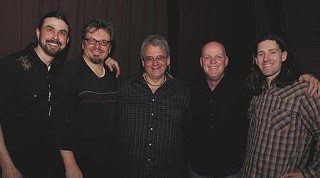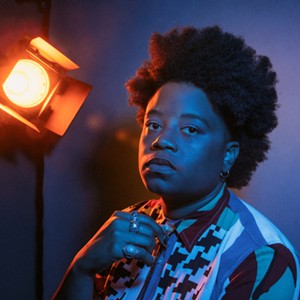It was in 1981 that New Grass Revival, the most “out there” bluegrass band in America (“out there” meaning a far cry from traditional porch-picking acoustic bluegrass) added a young banjo virtuoso named Bela Fleck to its lineup.
Fleck, and his unconventional take on the instrument – why, you can play just about anything on the banjo! – turned on an entire generation of players who felt the giddy liberation from time-worn musical bondage.
Of course, traditional bluegrass didn’t die out – how in God’s name could it? – and to this day, there are “progressive” bluegrass bands who simply add high energy (and maybe a bit of clogging) to the Appalachian cake mix.
There are some, like Jeff Mosier of Atlanta’s Blueground Undergrass, who took the hint from Fleck and freed the ol’ 5-string to go wherever they wished it to.
Blueground Undergrass, playing Friday at the Live Wire Music Hall, has become a fixture on the jam band circuit – the six-member ensemble includes banjo, electric guitar, fiddle, bass, drums and pedal steel, plus the occasional dobro and mandolin, and they can twist a tune into a 12-minute psychedelic hypnotic haze. Or not.
At the center of it all is Mosier. He put this band together 11 years ago, after a stint in the fabled Aquarium Rescue Unit with Col. Bruce Hampton, and swears he hasn’t had a single regret since.
How do you explain to people what Blueground Undergrass does?
Jeff Mosier: Well, that’s always a problem when you’re doing original music. That’s because you’re not associating with something that some genre-driven radio station has already put a label on. Most of my heroes are hard to label.
It melds my true bluegrass roots, Bill Monroe and Flatt & Scruggs, and Hot Rize, and my interim, which would be New Grass Revival. They were my template, they were my Beatles. I would scream like a teenager when I’d go see ‘em. It was the first time I’d seen any sonic music – I wasn’t a big rock fan – so when I saw Bela for the first time in ’82, my head came off.
In 1988, the nail in my mental coffin was probably meeting Col. Bruce Hampton. And instead of running for my life, I went with it. It allowed me to play the banjo for the first time as a musical instrument, and not as a bluegrass instrument.
I really wanted to start putting in ideas that weren’t just boom-chick, boom-chick, two-beat, two-beat, hillbilly get the pig, get the pig. I really wanted to take those poly-rhythms and put ‘em in my right hand.
Bruce has that effect on people, doesn’t he?
Jeff Mosier: He does. I call him the Great Permission-Giver. One of the wonderful attributes of playing with Bruce is that he only has one rule, but he’s very committed to it: His rule is that you play yourself, that you’re not up there for the beer pot and the chicks. You’re there to be affected by your experience of your own self, on your own instrument, in the context of a band. It changed my life.
We didn’t know we were a jam band. There wasn’t a “jam band scene” at that time. It was just us, Widespread, Phish – they were just a small band out of Vermont – Little Feat, the Allman Brothers, the Dead. And the Dead were their own thing. Even though I saw hippies spinnin’ around, I didn’t really know what it was. I’m a recovering Southern Baptist; I grew up in a very religious home, and I didn’t really think very much until I was about 28. That’s when my brain fired up for the first time, to do critical thinking about what I liked in culture and in art.
So Blueground Undergrass was my first attempt, at 39 years old, to put together a configuration that would allow me to do, sonically, everything that had affected me up to that point.
Just how influential was Bela?
Jeff Mosier: He watched Chick Corea onstage playing “Spain” and thought to himself “Every note he’s playing is right here on my banjo.” He’s my friend. I can’t say enough about him. We’re very blessed to have this man at the top of our food chain. He’s imaginative, he’s historical and he’s respectful. He spawned a tone, a way to think about banjo, he’s brought the world into it. It’s an African instrument – we’d probably be sitting around in powdered wigs playing chamber music if it wasn’t for some of the ideas that instrument brought to the table.
I guess the idea is that you make music to please yourself instead of some imagined audience?
Jeff Mosier: When I met Bruce, I was playing at Six Flags, doing theme park bluegrass … making rednecks happy who’d just got off the log ride. I meet this guy and he says Please yourself, and you will please others.
If you’re not really excited right before you play, if you don’t have that Oh boy, I can’t wait for them to hear what we’re gonna do tonight – instead of We’re gonna do a Diamond Rio cover or We’re gonna fuck up this tune by Alison Krauss – that’s two different paths. I think some people are happy on that second path. I would have a gun barrel in the roof of my mouth if I had to do that. And that’s really the honest truth.
If you’re not mixing your own paint, and cleaning your own brush, and putting your own canvas up, then I think you’re really cheating yourself out of your greatest gift as a human being. And that is creativity.
Blueground Undergrass
With: Lullwater, Wormsloew
Where: Live Wire Music Hall, 307 W. River St.
When: 10 p.m. Friday, July 31
Tickets: $12
Online: www.livewiremusichall.com
Artist’s Web site: www.bluegroundundergrass.com


























